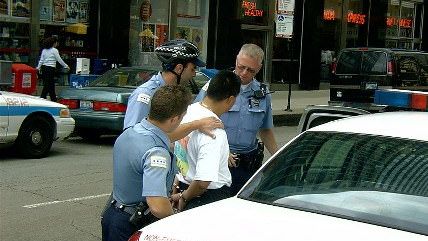Is On the Run Flawed Sociology or Interesting Impressionistic Journalism?
There may be a touch of Hunter S. Thompson in Alice Goffman's tale of inner-city life

Alice Goffman's On the Run caused a substantial buzz with its publication last year. A six-year ethnographic study of the pseudonymous 6th Street neighborhood of Philadelphia, where she immersed herself with the people and the culture, it characterized inner-city neighborhoods as, essentially, an archipelago of racially tense police states within a larger liberal democracy. In my generally positive review of the book, I noted "ethnography deliberately engages subjects in ways that escape the mile-high social-science approach; the tradeoff for such intimate and compelling access is that you're going to have a hard time documenting everything in a traditional scholarly way."
There's a possibility, in fact, that Goffman's documention and the story built on it more closely resembles advocacy journalism, or even Hell's Angels and The Electric Kool-Aid Acid Test, than traditional scholarship.
That "intimate and compelling access" as well as concerns over "documenting everything in a traditional scholarly way" are at the root of the new round of buzz around the book. At The New Rambler, Steven Lubet, a professor of law at Northwestern University, revives concerns over whether Goffman got details right—and also over whether she became so involved with her subjects that she implicated herself in a very serious crime.
Lubet isn't the first person to question some of Goffman's story. Sara Mayeux raised concerns over the book's claims that police peruse hospital visitor logs for people with open warrants. Lubet builds on Mayeux's concerns, adding that this would violate the Health Insurance Portability and Accountability Act and that the Philadelphia Police Department denies doing any such thing.
That may or may not be a real rebuttal to an interesting part of Goffman's story. Alex Tabarrok writes that HIPAA actually does not shield data from the police. I'll add that the law may be entirely irrelevant—running checks on hospital visitors could well be an unofficial practice that's codified nowhere, much like the Drug Enforcement Administration's back door access to Amtrak passenger records.
More serious for Goffman is On the Run's tale of the sociologist behind the wheel of a car, willingly transporting gang members seeking lethal revenge against rivals who had killed one of their friends. Writes Lubet:
I sent the relevant paragraphs from On the Run to four current or former prosecutors with experience in Pennsylvania, New York, New Jersey, and Illinois. Their unanimous opinion was that Goffman had committed a felony. A former prosecutor from the Philadelphia District Attorney's office was typical of the group. "She's flat out confessed to conspiring to commit murder and could be charged and convicted based on this account right now," he said.
And that's based on the plain words in Goffman's book. The implications of the passage don't detract from On the Run's message about the destructive impact on neighborhoods of the drug war and police tactics, but they have spurred discussion about professional ethics among sociologists—and raised real risks for her.
Lubet allows that the legal concerns apply "[t]aking Goffman's narrative at face value." This emphasizes suspicions that not all of the author's experiences occurred as she relates them. Unfortunately, it's almost impossible for her to refute such charges, since she says she shredded her notes and destroyer her hard drive to eliminate the "threat of being subpoenaed."
Which makes fact-checking a little challenging.
Goffman isn't alone among ethnographers in entwining her personal life with that of her subjects. In my review of Floating City, a book that I also found worthwhile, I noted that author Sudhir Venkatesh's "observer status is colored by moralistic biases and a shambolic personal life, and is compromised by his close interactions with his subjects." Even so, I found the book a fascinating glimpse at underground markets in a dynamic world.
Both books struck me as having at least as much resemblance to the impressionistic "new journalism" of Hunter S. Thompson and Tom Wolfe as to the detail-intensive work of social scientists. Thompson, in particular, was known for getting creative with his tales. The Hell's Angels' Sonny Barger insists the writer initiated his own beating in order to have a story to tell that turned into a big marketing hook for the Hell's Angels book (Barger, incidentally, told me the same thing when I briefly met him a long time ago). His Fear and Loathing on the Campaign Trail '72 is probably a better take on that year's political combat because of its exaggerations rather than despite them. You might not want to take a quote as gospel, but the overall story stands.
In my review of On the Run, I wrote, "Some of the questions its critics have posed are almost inevitable for a work at the intersection of sociology and advocacy journalism. Is the author just recording observations or is she trying to reveal a larger truth?" But Alice Goffman isn't likely to thank me for suggesting that any inaccuracies and liberties her book might contain are understandable as acts of impressionistic journalism. She is, after all, an assistant professor of sociology at the University of Wisconsin-Madison. She's assumed, I would think, to be getting the details right, not painting in coarse strokes.
As the to the legal issues…She'll have to respond to those on her own.
Goffman isn't answering questions right now, but she tells me that she'll respond in full by the end of the week. Hopefully, we'll discover then whether she has documentation for her stories, and answers to serious legal questions—or whether her book is at least partially a still-fascinating work of impressionistic journalism.


Show Comments (32)